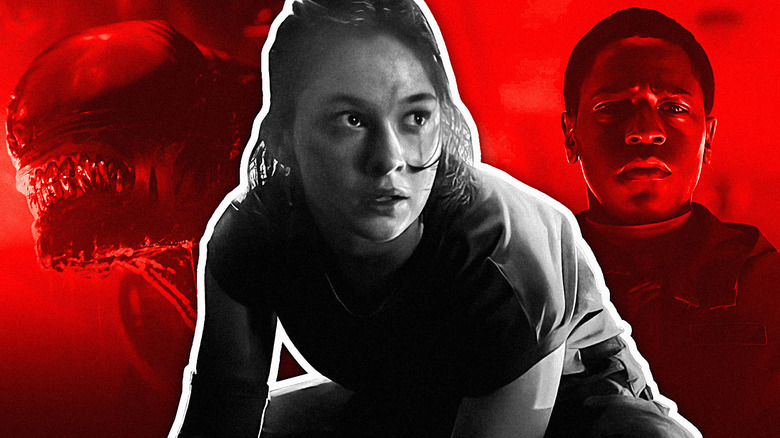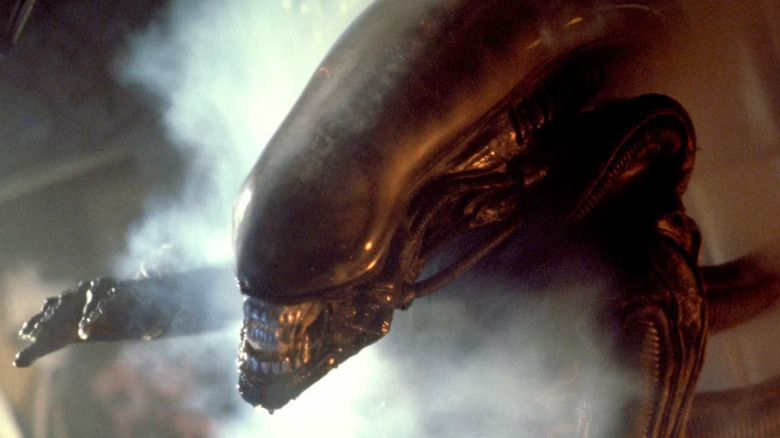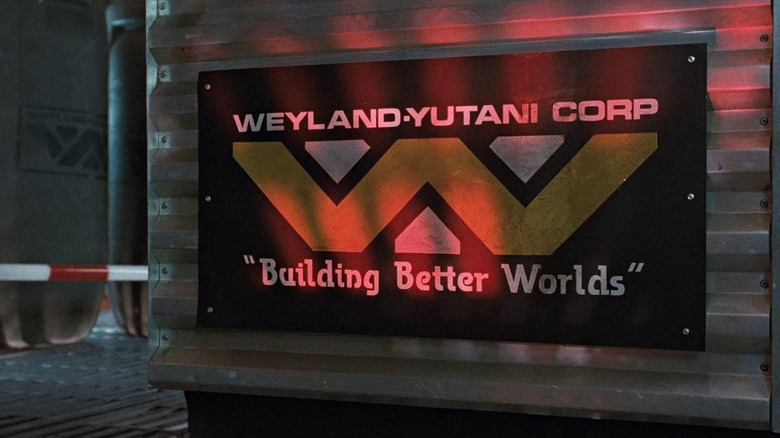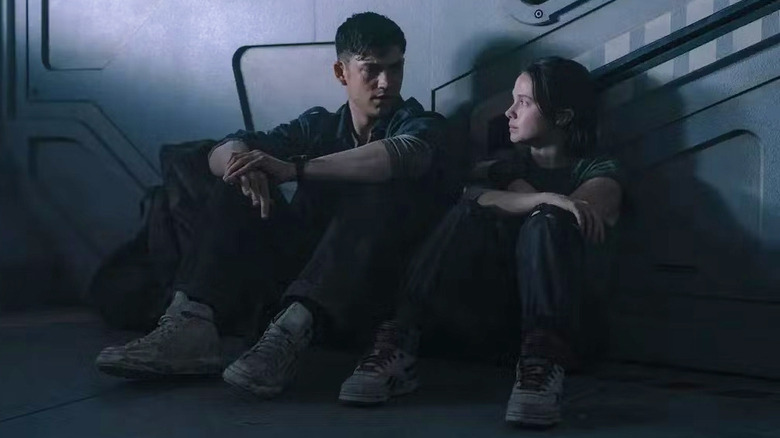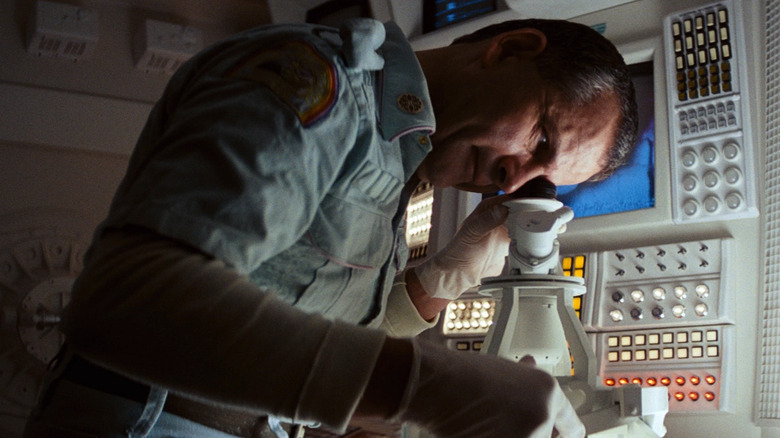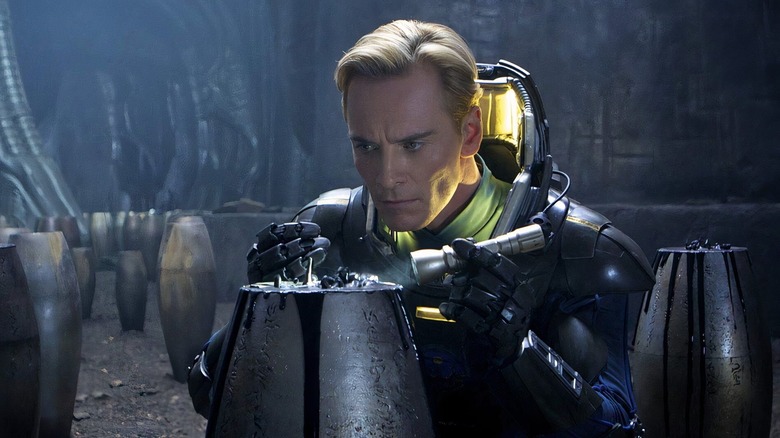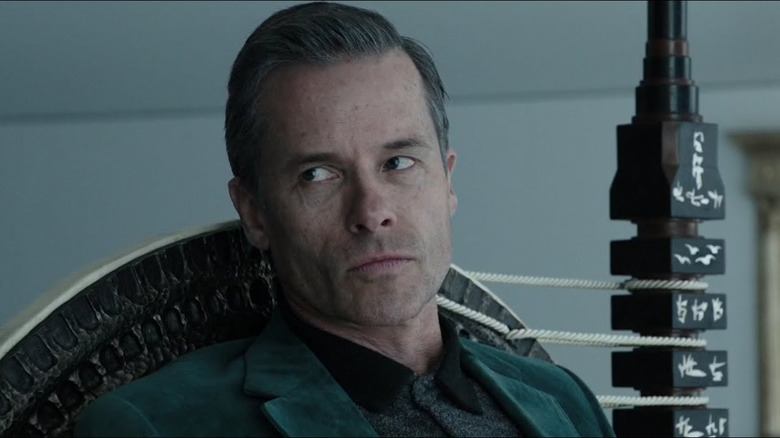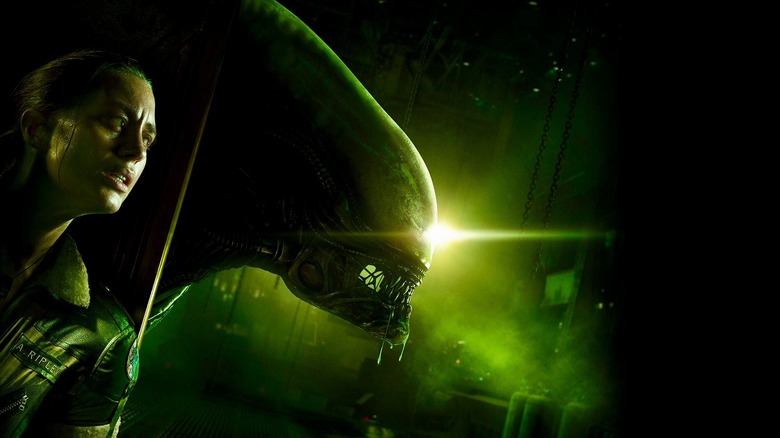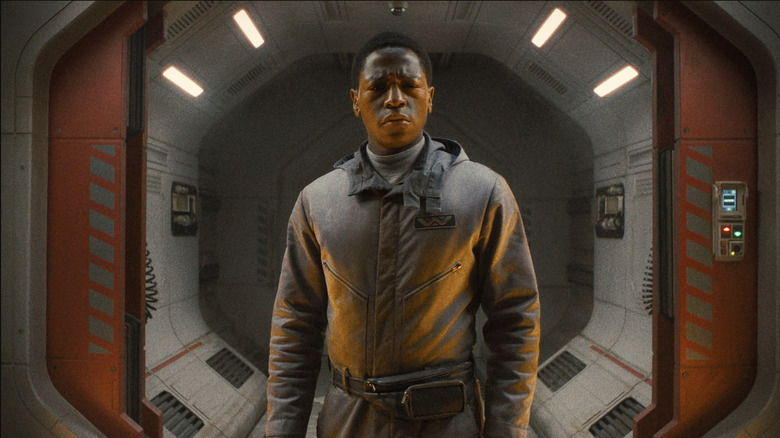The Best Easter Eggs And References In Alien: Romulus
"Alien: Romulus" spoilers follow.
For a sci-fi horror franchise that began weaving a web of terror with a steamy egg that housed a creepy, crawly creature, the "Alien" franchise has never been soaked in nostalgia. Even the more recent installments like "Prometheus" and "Alien: Covenant" didn't force a lot of Easter eggs and callbacks to previous entries, simply because that's just not Ridley Scott's style unless it's pertinent to the story.
But since "Alien: Romulus" takes plenty of narrative cues from the original "Alien" with a splash of "Aliens" and "Prometheus" and gives them somewhat of a "Star Wars: The Force Awakens" retread, there are plenty of Easter eggs and callbacks that refer back to various chapters of the "Alien" franchise, including one of the more successful video games. We're not looking at a "Deadpool & Wolverine" level of Easter eggs lurking in the background, but we've assembled a list of references and callbacks that fans will appreciate and that newcomers to the "Alien" franchise would surely like to know about.
So let's dig into some "Alien: Romulus" Easter eggs and references, courtesy of the Weyland-Yutani corporation. The company that cares!
The original xenomorph from Alien is back
If you thought the original xenomorph from the first "Alien" movie was dead after Ripley shot it with a grappling hook and ejected it into space, think again! The xenomorph is such a durable organism that it survived the cold of space, the lack of food and oxygen, and managed to preserve itself inside of a rock. After Weyland-Yutani learned of the creature's attack on the Nostromo, they navigated to the site of the incident, where the remains of the exploded ship are still floating in space. The company snags the rock containing the xenomorph, and they hope to use it to fuel their research inspired by Peter Weyland, as outlined in "Prometheus."
Of course, even though Weyland-Yutani ends up getting what they needed, they also weren't prepared for the xenomorph to be alive. It awoke and wreaked havoc on the space station, killing many aboard before finally being destroyed itself, while its acid blood tore through many levels of the Romulus/Remus space station.
Interestingly enough, the organism is referred to by the android science officer Rook as Xenomorph XX121, a label first coined by S.D. Perry in "Alien: The Weyland-Yutani Report," a fictional technical guide containing the history of the xenomorph and its interactions with mankind. However, the term actually first appeared in the novel "Alien: Sea of Sorrows," which was published a few months before the Weyland-Yutani report.
The return of the original xenomorph is one of several elements that makes "Alien: Romulus" much more of a direct sequel to "Alien" than we originally anticipated. (Ethan Anderton)
Weyland-Yutani still sucks
Because "Alien: Romulus" takes place between "Alien" and "Aliens," no one was expecting the fictional Weyland-Yutani Corporation to somehow become a company that actually cares about people. Since the "Alien" franchise began, they've proven time and time again that they're willing to sacrifice plenty of human life in order to get ahold of a living xenomorph organism, in order to fuel their scientific research. While they claim it's for the betterment of humanity in an effort to turn human beings into the perfect organism by using xenomorph biology, it's really the desire of one Peter Weyland (again, more on that later) wanting to live longer that drives their greedy, misguided efforts.
Therefore, we're not at all surprised to see that Weyland-Yutani is still screwing over people who work for them. First of all, they increase the work quota that Rain has to put in at the Jackson Mining Facility, effectively denying her application to be transferred to another planet where she can work in farming. This comes after Rain awakes to hear a Weyland-Yutani company loudspeaker say, "The safety and well-being of the company is our first priority." Notice how they say "the company" and not its employees? Sounds about right. The people know how much they suck too, because the Weyland-Yutani logos are often vandalized with graffiti, and there are protests at the Jackson Mining Colony over their treatment.
Furthermore, later in the movie, it's clear that Weyland-Yutani is still prioritizing their scientific efforts inspired by Peter Weyland when Rain's android brother Andy is forced to follow through on the company's failed mission to preserve their research with no regard for the human life on the Romulus/Remus space station.
Yeah, Weyland-Yutani still sucks, folks. (Ethan Anderton)
Tossing back some Aspen Beer, courtesy of Weyland-Yutani
We love fictional brands in cinematic universes, don't we? Sure, product placement is easy and makes people money, just as the Weyland-Yutani corporation prefers. But it only makes sense that Weyland-Yutani would also have their hands in the alcohol business, and that's why we have Aspen Beer, the official beer of Weyland-Yutani (though clearly the original production design called the company "Weylan Yutani," as you can see in the original movie).
Aspen Beer has appeared in various "Alien" movies, all the way back to the original movie in 1979. You can see several cans sitting on the dining table and being drunk by various characters in the scene where Kane (John Hurt) has his chest busted open by a Xenomorph. Aspen Beer returns in "Alien: Romulus," where it can be seen on a table while Rain learns of the heist her friends plan to execute in order to get ahold of cryo pods that will allow them to make the long journey to Yvaga without going through official channels.
Plus, in case you haven't heard, Angel City Brewing is offering Aspen Beer at their locations in California, and it's also available to order in cans. There are also certain theaters in California that will have it on draft, but you'll have to do some digging to find them, because an official list hasn't been made available.
If you want that t-shirt above, head over to Last Exit to Nowhere, which has some awesome, deep cut pop culture shirts. (Ethan Anderton)
The Alien franchise still loves Reebok shoes
Beginning with the high-top stompers worn by Ellen Ripley in "Aliens," the franchise has consistently had a relationship with the sneaker community — specifically, Reebok. Ripley's shoes were a coveted item for three decades, but Reebok released pairs to the public in 2016 in celebration of the film's 30th anniversary. The Alien Stomper Hi shoes were identical to the ones worn in the film, with screen-accurate white, red, and grey colors and velcro straps. They released 426 pairs to coincide with the April 26 release date, but also released a less-limited (1,986 pairs) version of mid-tops that were for daily wear.
In the years that followed, shoes based on Bishop, the P-5000, and the designs known as Bug Stompers and Alien Stompers were also made available. For "Alien: Romulus," Rain Carradine is shown wearing a new design of Reebok stompers, with a close-up shot of her climbing a ladder, putting the shoes on the best display possible. The moment is not just a highlight of some pretty sweet kicks, but also a nod to the sneakerheads who have kept "Alien" footwear some of the most coveted in the game. (BJ Colangelo)
Rook is just a new version of Alien's android Ash
Other than the original xenomorph, "Alien: Romulus" doesn't bring back any of the characters from the rest of the "Alien" franchise. But it does give us a different version of the android called Ash, played by Ian Holm in the original "Alien." However, since Ian Holm sadly passed away in 2020, a mix of animatronics, visual effects, and artificial intelligence-fueled audio brings the actor back to life as Rook, the science officer aboard the Romulus/Remus who has again been tasked with retrieving a Xenomorph for Weyland-Yutani. And he still hasn't given up his mission, despite losing the lower half of his body.
While the throwback to another android makes sense narratively, the visual effects used to bring Holm back to life cinematically look mostly unsettling and just plain bad. Though seeing Rook mostly destroyed could help explain why Rook looks glitchy, he doesn't appear to malfunction in the same way that he does when his head is removed from his body in "Alien." Instead, the movement of the mouth looks like an awful DeepFake applied to an animatronic head. It's strange, unnecessary, and there was a much better way around this issue (more on that later). But at the very least, it's a menacing return for a character who made a dark turn in the original "Alien," even though it's not executed very well. (Ethan Anderton)
The return of black goo from Prometheus
By all accounts, "Alien: Romulus" had the makings of a standalone sequel in this franchise. Set between "Alien" and "Aliens" and starring a brand-new cast of characters, it didn't appear that director Fede Álvarez would add any overt connective tissue to previous films in the series — beyond the Xenomorphs themselves, of course. But as Noomi Rapace's Dr. Elizabeth Shaw so memorably put it, "I was wrong ... we were so wrong!" That "Prometheus" quote turned out to be relevant on multiple levels, however, as "Romulus" ended up reaching into the past of the divisive prequels and brought back key plot points from both "Prometheus" and "Alien: Covenant."
The most significant of them involves the so-called "black goo," first introduced in "Prometheus" during the doomed crew's expedition to a star system far, far away from Earth. Here, in what appeared to be some temple of the Engineers (but was actually the cargo hold of one of their starships), the hapless humans came across mysterious containers that would eventually begin oozing some dark, insidious liquid. Only the malicious synthetic David (Michael Fassbender) has any inkling of what it is: a bioengineered substance with the power to both create life and destroy it.
This comes back in a major way in "Romulus" when Cailee Spaeny's Rain and her friends come across a research lab on the space station Romulus, where they discover that Weyland-Yutani had continued experimenting on the "black goo" in the hopes of benefiting the human race. Naturally, this only spiraled out of control and led to the outbreak of facehuggers and Xenomorphs on the station. Even all these decades later, David's haunting words keep reverberating throughout this franchise: "Big things have small beginnings." (Jeremy Mathai)
Peter Weyland is name-dropped by Rook
Peter Weyland's been the unseen man behind the curtain throughout the entirety of the "Alien" franchise and the one ultimately responsible for every major event that takes place by proxy of his sinister Weyland-Yutani corporation, though it took over 30 years for him to finally appear in the flesh in 2012's "Prometheus" (or, more accurately, in a viral marketing video released prior to the movie's debut). Still, he's cast an enormously long shadow throughout the decades, to the extent that even the (semi-canonical) "Alien vs Predator" movie in 2004 couldn't help but include a connection to Peter's father. We last saw him in the opening scene of "Alien: Covenant," this time looking rather age-appropriate in a flashback as Weyland introduced himself to the newly-born synthetic David. All this led to his latest namedrop in "Alien: Romulus," which further tied him together with the events of the new sequel.
At a crucial juncture in the film, our new batch of characters are given the lowdown on just what kind of nefarious schemes Weyland-Yutani has been up to on the space station Romulus. The half-destroyed synthetic Rook (a similar model as Ash from the original "Alien," played by the late Ian Holm) explains that, along with the "black goo" introduced in "Prometheus," the company has been attempting to accomplish what Peter Weyland gave his life pursuing — namely, the evolution of the human race and even a solution to death itself. In and of itself, alluding to Peter Weyland isn't a terribly unexpected twist. But by further referencing the events of "Prometheus," where Peter died pointlessly at the mercy of the Engineer race that created humanity in the first place, "Romulus" doubles down on one of the most divisive franchise movies in recent memory. (Jeremy Mathai)
Yep, that's the emergency phone from Alien: Isolation
Don't call yourself an "Alien" fan unless you've suffered through dozens of hours attempting to beat "Alien: Isolation," the video game that will have you dying hundreds of times in gruesome ways and shortening your life expectancy through absurd amounts of stress! The 2014 survival thriller is considered a modern classic and for good reason. Centered on the exploits of Amanda Ripley (yes, the daughter of Sigourney Weaver's Ellen who was mentioned in the director's cut of "Aliens"), our hero goes on a thoroughly ill-advised quest for closure upon hearing that the flight recorder of the lost vessel Nostromo has been recovered and taken to the Sevastopol space station. Believe it or not, the Xenomorphs that haunted her mother have found their way here, too, and your only chance of making it out alive is to hide.
"Alien: Romulus" director Fede Álvarez has confirmed that he included overt references to "Alien: Isolation," which eagle-eyed fans may have already spotted from miles away. As the filmmaker explained, he made sure to have an emergency phone mounted on the walls of the Romulus space station every time some serious action is about to go down. This, of course, lines up with the game using these frequent checkpoints as a save station. Gamers quickly internalized the idea that the sight of one of these phones meant that they could anticipate (read: dread) the arrival of an unfriendly synthetic, trigger-happy survivors, or a bloodthirsty Xenomorph lurking around the corner.
The effect in "Alien: Romulus" is eerily similar on a subconscious level, training viewers in the know to expect the absolute worst. This is easily one of the film's cleverest and most fun Easter eggs. (Jeremy Mathai)
Andy takes some lines from Aliens
When Andy (David Jonsson) first deals with Bjorn (Spike Fearn), the latter's disdain for androids of any kind is well on display. He insults him, he berates him, and he calls him outside of his name. Andy corrects him and says he prefers the term "artificial person." This is a direct callback to Bishop (Lance Henriksen) in "Aliens," who upon being called a Synthetic replies, "I prefer the term artificial person myself." Given the timeline, it's possible that Bishop's model will develop this stance based on the programming of Andy's model. However, it is strange that when the team of "Romulus" finds half the model of an artificial person named Rook, he has the face of Ian Holm, aka Ash" from "Alien." Rook and Bishop are both the names of Chess pieces and strategically, Bishops are typically more powerful at the start while Rooks are more powerful over minor pieces during the endgame ... there was a missed opportunity to use Henriksen's likeness.
In the pivotal climax of "Alien: Romulus," Andy breaks free of his meek and passive programming, destroying a Xenomorph to protect his companion (and "sister"), Rain Carradine. Utilizing an elevator crashing down, he obliterates the alien while yelling out, "GET AWAY FROM HER!" Once the elevator stabilizes, he unconfidentally utters " ... You b***h." Andy is not one to swear, and something is charming albeit unnatural about him cursing to emphasize a badass moment. This line is, of course, a reference to arguably one of the most memorable moments in the entire franchise, when Lieutenant Ellen Ripley utters the same line while wearing the P-5000 Powered Work Loader to indicate she's picking a fight with the Xenomorph Queen to protect Newt. She is infinitely more confident with swearing than Andy. (BJ Colangelo)
